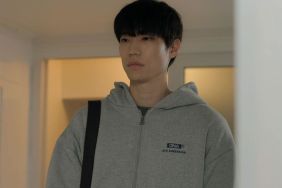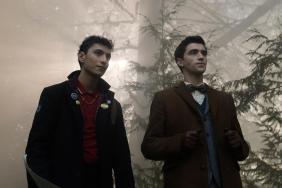Barring the fact we had already decided Greg Berlanti was one of the nicest people we’ve met this year–and that was having spent less than 40 minutes with him total–and the fact he’s already one of the coolest filmmakers for his involvement in bringing two of our favorite comic book characters to the movie screen, but Berlanti has also directed one of those rare romantic comedies (of sorts) that hasn’t made us want to firebomb the studio who’ve subjected us to it.
Life As We Know It stars Katherine Heigl and Josh Duhamel–who unfortunately have both been a part of the romantic comedies that have–and their pairing creates the near-perfect chemistry in what might start out like a “meet cute” comedy romance but quickly turns into something more like the classic ’80s comedy Parenthood.
They play Holly Berenson and Eric Messer, two singles sent on a blind date by their best friends that goes horribly wrong. Years later, after said friends die in a sudden car accident, they’re assigned the job of caring for their 1-year-old daughter Sophie, despite not having any experience with babies and not particularly liking each other very much. Still, they agree to live together in their friend’s house and try to get along for the sake of Sophie, creating lots of hilarious and poignant moments in the process. It’s certainly a fun movie regardless of your gender, and should be enjoyed as much by those who hope to be parents someday as those who already are.
ComingSoon.net sat down with Greg at the New York junket for his movie, months after first having met him at ShoWest where the first footage shown from the movie went over like gangbusters with the exhibitors in attendance.
ComingSoon.net: I’m glad the movie actually lived up to those great clips, although few of them have made it into the commercials, maybe because they’re too dark.
Greg Berlanti: Yeah, exactly. It is a little bit more acerbic than people realize maybe going in, but that’s hopefully a good thing.
CS: But there’s some great gags, but I guess you can’t show sh*t on someone’s face on television and have it fly by the MPAA or the censors.
Berlanti: (Laughs) Exactly.
CS: I didn’t realize–and I’m sure most people don’t realize–you actually directed a movie like 10 years ago called “The Broken Hearts Club.”
Berlanti: Yes.
CS: I haven’t seen the movie, but it was also a romantic comedy, and I was curious how you went from there and doing all this TV stuff, and you’re back to directing and also doing a romantic comedy? I guess let’s start with where this project came from.
Berlanti: I definitely wanted to get back into directing. Showrunning in television is a lot like directing, because you’re sort of crafting the story from the beginning and you’re the arbiter of the emotional experience from the inception all the way to when people see it. TV while I’ve been in it has been a great training ground to sorta get back into it. I mean, you edit all the episodes, you spend hours and hours in the editing room and you spend a lot of time on set and a lot of time re-crafting the script. They’re very similar processes, but the difference is with film, you really have more time with each stage to do something of, I think, of better quality and to really make more definitive choices, and you’re not making them as quickly and you just have more time to shoot, to write, to polish. This was a little bit of an accelerated process because Katie had a window of when she could make it. I read the script last May and got the job the end of June and we were shooting in September, so yeah, they did have to move fast. Also, some of the TV experience that I had again I was able to use it in terms of like, “Alright, how quickly can we prep this film?” We prepped it in about six or seven weeks to shoot really. So it came to me, and tonally when I read the script, it was very similar to a lot of stuff I’d actually done in TV and even “Broken Heart’s Club” to a degree in that it really moved and had romance and it had comedy and it hopefully made people laugh and cry. The original script, when I read it, it struck me for it to take such a really darker turn 20 to 25 minutes into the film and then to see, “Well, how does the audience recover from that?” All the things I’ve sort of done, I’ve had sort of tragedy and comedy kinda mixed together I think whether it was “Everwood” or “Broken Heart’s Club,” and just how difficult it could be coming out at the time or being gay and then how do you overcome that and still find love? In this, it’s sort of, “How do two people obviously get over the death of both their friends?” The immediacy of a child seemed to me like, “Oh, that felt very real.” I guess I’m most interested in all the stuff I do in terms of just things still feeling authentic and real that they can still move in the waters of whatever the genre is, but that they feel real to us. When I read the script, or when you watch a performance and you give notes, for me it’s all just the emotional experience I’m having and does it feel authentic? If it feels real, then it can go to all these different places. It can be funny one minute or sad the next, but if it doesn’t feel real and it feels either too schmaltzy one way or too broad comedically, it’s a lot harder to sort of weave in and out. There are tons that I’ve liked mixing in television and even in that first film and they were all present in the script, so they really excited and interest me in bringing it to the screen.

CS: Did you have to do a hard sell to Warners to convince them to let you direct or were you already working with them?
Berlanti: I was working with them on “GL” and they knew I wanted to direct. They sort of said to me, “Well, let’s find you the right-sized movie to do, and the movie that feels right for you.” I hadn’t worked with Katie before and I hadn’t worked with the producers before, so I had to meet with all of them. Katie was also a producer on the film, and she was very supportive. A lot of people I think in her position with her status, she could get a movie like this made…
CS: This would have come after her having three huge hits.
Berlanti: Absolutely, she pointed to the script and said, “I want to do that,” and that got the movie made really.
CS: That was before you even came on?
Berlanti: That was before I came on. They were gonna make it, so I came in and sort of gave her my take on it and what we would maybe do still to the material and why I felt like tonally this was an important film and had great elements of some really terrific and wonderful classic romantic comedies. She loved all that. Because I think we both came out of doing a lotta TV, and she had actually watched one of my shows, “Everwood,” she had been a fan of, she knew that tonally it was similar. That (show) was about the death of a mother and a father and a son trying to get over the death of a mom and still have allowed for humor. I think they were all things that were important to her, and we sort of connected and it worked out great.
CS: I definitely got the impression you were trying to avoid a lot of the clichés of the genre. Obviously, Katherine has done a lot of movies in this genre already and the cliché is that they fight, fight, fight and then they fall in love. There are definite clichés you got away from like with the airport scene at the end and the twist you put on it.
Berlanti: We’re just trying to twist everything as much as we could, and again, you do that in TV all the time, too. You’re like, “Alright, the audience expectation is that blank will happen and we want to give them that ’cause you want that part of the experience, but you don’t want to totally give them that, you know?” (Laughs)
CS: Yeah, that’s the hard part because people expect stuff and they want stuff certain ways.
Berlanti: Absolutely.
CS: Though you can’t just kill your two leads in a car accident at the end either.
Berlanti: Exactly, yeah, they have to get together. There is a fatigue with romantic comedies right now, I feel it, but my favorite ones somehow rise above it in moments with performance. We added all the neighbors around them. I’m a big fan of all the Working Title romantic comedies. They always find a way to populate it, so that every performance gets their moment. That way, the two leads aren’t having to carry the whole comedic burden of the piece, you know? So we tried to populate it… and a lot of the people we cast in those roles were all out of UCB (Upright Citizen’s Brigade) and Groundlings and brought a lot of improv to the table. Those performances hopefully felt fresh too and I think they livened the film up and move it just a little bit more, again, out of that just sort of like, too traditional romantic comedy genre, and just a little bit ensconced so that people hopefully again, are surprised when they finish watching it.
CS: Yeah, you get huge props by the way for using Melissa McCarthy.
Berlanti: Yeah, she’s terrific.
CS: She’s amazing and she really hasn’t appeared in many movies. I remember when I saw the clip at ShoWest, and I didn’t realize that was her making the “sh*t on your face” comment. Then I saw her name in the credits and thought, “Okay, if nothing else, this is going to have some funny moments ’cause she’s in it.”
Berlanti: Exactly, yeah, and you know what? There are a lotta people who are gonna come in who are gonna be thinking just that because maybe their girlfriend dragged them or maybe their friend dragged them. At every phase whether it was with the construction of the house or whether it was the casting of the people or the script, it was, “How can we make this even just 10 or 15 percent better than people expect a movie like this to be? So they walk out and they go, ‘Oh wow, that was actually like a good time and it felt real.'” A lot of the cast was… Kumail Nanjiani, his friend at work. He’s a rising stand-up comedian and the other neighbor is Rob Huebel is also a big…
CS: Will Sasso from “Mad TV” as well.
Berlanti: Will Sasso is terrific. Yeah, so every day that they were on the set, everybody was just in stitches and we would just let the cameras roll a lot of times and it was really pretty great.

CS: When you talk about the whole problem getting over the death thing, just now I realized that Pixar has been doing stuff like that in many of their movies, whether it’s “Finding Nemo” or “Up.” They kill somebody in the first few minutes and then they have different characters coming in and livening up the comedy, so they find some way to get them laughing again, but there’s a lot of poignancy at the end and that’s very tough to do.
Berlanti: Well, they’re not afraid to make movies that make you laugh and cry. I think a lot of what happens with a lot of studio films these days – and again, in a lotta ways this is Katie’s credit for looking at a movie like this and going, “You know, I’m gonna do it.” A lot of other studios passed on this material because of the death of the parents, then Warner Brothers said, “No, we’ll do it.” Katie really wanted to do it. Yeah, I think a lot more and more, everybody wants to sorta put things into a box like, “Okay, a romantic comedy has to just be this, so we’ll just do that. A drama has to just be this.” Things feel so compartmentalized. I think the best films–and you’re right, Pixar’s almost as good if not better at it than anybody–just fuse all those emotions together.
CS: You talked about the extra characters coming in and it’s great how they all get their moments and never wear out their welcome. Like the taxi driver comes in and he’s there for just five minutes but he kills it.
Berlanti: That’s right, Faizon Love, so that’s another one. Yeah, that was our standard was like, “Alright, we want all these people that everybody could walk out (of the movie) with maybe a different favorite person.” It’s like notes or players in a symphony, you know?
CS: Was all of that in the script, though? I was curious how much of that was in the script and how much was stuff you realized you had to add.
Berlanti: Yeah, some of it was in the original script and that was just the mantra. Some of it also is when you cast it that way, you end up rewriting it toward the actor’s voice a little bit more. Faizon was not in the initial script, but once we knew we had him we wanted to make a real fun moment of that. Then the same thing with the woman who played Janine, the CPS worker, Sarah Burns, she’s another improv artist. We didn’t want the typical stalwart kind of person from the government who comes in and is gonna take your baby back. We wanted just a little bit off-kilter, so she brought so much to it and you find yourself on the set kind of re-tweaking things and trying to just use the moment. You over-prepare so that on the day you can kind of change your mind about things I think.
CS: Did you put any Christopher Guest moments in the party scenes where you could just let the actors go and pick out the best parts later?
Berlanti: Oh, totally. All that whole dinner table scene with them around. We did a thing that’s gonna end up just on the DVD. We were gonna maybe do it for the closing credits–they used it a little bit in the trailers–which was all the parents with all their kids wishing a happy birthday to Sophie for her second birthday. We didn’t end up using it, but all of those people were golden. We did a week and a half of rehearsal beforehand with Katie and Josh and then with them. I had to get to know the babies obviously, too. That was a big part of learning the babies’ schedules because there were triplets and we had to figure out, “Alright, how are we gonna…? Which babies do we want for what scenes? What are they like at two o’clock in the afternoon, or 2:15 in the afternoon? How do we get them a little bit on our schedule?” and all that kinda stuff. Then I would rehearse also with the neighbors and stuff at night. We did a lot of improv and they all sorta just started to create their own characters because though they only come in for a second or two, you want to feel like they’re real, fully-formed relationships. Even though they come in intermittently I should say. All those different individuals that kinda come in and out of a story. If they don’t feel fully-formed and they come into this triumvirate that we love of Katie and Josh and the baby, they feel like interlopers and you just want to get them out of there, but they didn’t feel like that.
CS: I actually wanted to ask about Sophie because she really steals a lot of scenes. You used triplets so did you figure out which one of them was better for certain things?
Berlanti: Yes, not only better for certain things, but they’re like people in that I would go backstage…
CS: Babies are like people?!?
Berlanti: (Laughs) Exactly. But they’re like fully-formed adults in certain ways and I didn’t realize before we made the movie. I would go to the green room, the holding room for the babies, and the baby that was always lit up the most when she was on camera was the shyest of the sisters. The baby that was the bossiest and the happiest in the green room was the one that we always used for the crying scenes because you’d bring her out to set and she’d have a panic attack. (Laughs) It was so fascinating to see the psychology of like… one baby learned that if we would all applaud after a big scene, they’d smile. So one baby picked it up, so I’d yell, “Cut,” and the baby would start applauding. I mean, they’re 15 months or 16 months. I don’t have kids, though I have nieces, so I hadn’t spent this kinda time where you realize how crafty they are even at that age. (laughs)

CS: How did Katie and Josh deal with the kids?
Berlanti: They were great, too. Katie had just adopted a baby, so she was literally going from a baby at home and learning about it and then coming to work and then saying, “Oh this baby does that? Wait a second. I have to make sure.” You know, and she’d pick up tips.
CS: What kind of changes does an actor have to make while acting opposite a baby?
Berlanti: The best thing about it (was that) again, it kept everybody so natural because it was a little bit like having a lead actor who’s like a drunk of something, you know? (Laughs)
CS: Not that you’ve ever had that experience before, I’m sure…
Berlanti: They’re like screaming all of a sudden and then happy all of a sudden and then everybody’s sort of like really afraid of the mood of the baby, so it was a little bit like that.
CS: That’s going to be the lead quote for this interview: “Working with a baby is like having a lead actor who is a drunk.”
Berlanti: (Laughs)
CS: I was curious about how you compartmentalize all the stuff you’re working on, because you obviously have a movie coming out, you have a couple others in production and you have the TV show. (“No Ordinary Family,” which started earlier this week.)
Berlanti: Yes. People, yeah, it’s with people. I think of the TV show and I think of Jon Feldman who I do that with. He carries the burden of that most of the day, then I go in and out of that with him. With the film, Michael Green and Marc Guggenheim are writing “The Flash,” I work on it with them. So for me, it’s divided up by people and that helps me ’cause then it’s not as much. If I think about it as just the project or all of the stories, they do overwhelm you because you have to keep track of all these different things. If I have a person to sort of throw the ball back and forth with, it makes it a lot easier to go because then things are happening even when you’re not working on it, you know? Their focus may be on the problem of the day, but I can focus on maybe the bigger picture of the thing.
At this point, we got into talking more about Green Lantern and some stuff about The Flash, which you can read over on SuperHeroHype, but we ended with a quick shout-out to Geoff Johns, DC Entertainment’s Chief Creative Officer, and the man who revitalized both characters in the comics:
CS: By the way, I’m a bigger “Flash” fan than a “Green Lantern” fan.
Berlanti: Oh really, that’s great. This is my favorite question to ask – what was it about “The Flash” that appealed to you?
CS: Probably the Rogues’ Gallery.
Berlanti: There were multiple villains on him.
CS: There’s so many villains, yeah. I read “The Flash” as a kid and in fact, the first time I interacted with Geoff Johns was when I was reviewing comic books and he Emailed me after I reviewed his first issue. But yeah, I’m a big “Flash” fan, probably ’cause I also talk fast.
Berlanti: (Geoff)’s awesome. He’s as much a reason as anybody that the “GL” movie and “The Flash” movie are possible, just the way he revitalized the characters and what he’s doing now even at DC, so he gets a lotta props.
Life As We Know It opens on Friday, October 8.









